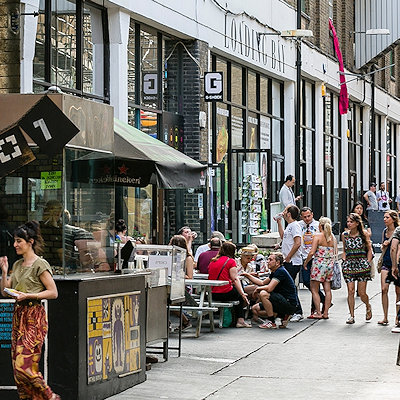
Like us on Facebook
PLACE NAMES


 
|
|
Shoreditch
|

|
|
|
The etymology of "Shoreditch" is debated. One legend holds that the place was originally named "Shore's Ditch", after Jane Shore, the mistress of Edward IV, who is supposed to have died or been buried in a ditch in the area. This legend is commemorated today by a large painting, at Haggerston Branch Library, of Jane Shore being retrieved from the ditch, and by a design on glazed tiles in a shop in Shoreditch High Street showing her meeting Edward IV.
However, the area was known as "Soersditch" long before Jane Shore's life. A more plausible origin for the name is "Sewer Ditch", in reference to a drain or watercourse in what was once a boggy area. It may have referred to the headwaters of the river Walbrook, which rose in the Curtain Road area.
Though now part of Inner London, Shoreditch was previously an extramural suburb of the City of London, centred on Shoreditch Church at the crossroads where Shoreditch High Street and Kingsland Road are crossed by Old Street and Hackney Road.
Shoreditch High Street and Kingsland road are a small sector of the Roman Ermine Street and modern A10. Known also as the Old North Road, it was a major coaching route to the north, exiting the City at Bishopsgate. The east–west course of Old Street–Hackney Road was also probably originally a Roman Road, connecting Silchester with Colchester, bypassing the City of London to the south.
Shoreditch Church (dedicated to St Leonard) is of ancient origin and features in the famous line "when I grow rich say the bells of Shoreditch", from the nursery rhyme Oranges and Lemons.
Shoreditch was the site of a house of canonesses, the Augustinian Holywell Priory (named after a Holy Well on the site), from the 12th century until its dissolution in 1539. This priory was located between Shoreditch High Street and Curtain Road to east and west and Batemans Row and Holywell Lane to north and south. Nothing remains of it today.
South Shoreditch (the are just outside the original City of London) is currently undergoing an enormous transformation. Several five or six storey buildings have been knocked down in the area of Shoreditch which borders the City of London. In their place will be erected a variety of very tall buildings, mirroring the architectural styles in the City of London. The building will result in more residential units being available for sale in Shoreditch than were produced by the Olympics athletes village.
|
 Feel free to Email me any additions or corrections Feel free to Email me any additions or corrections
LINKS AVAILABLE TO YOUR SITE
| |





